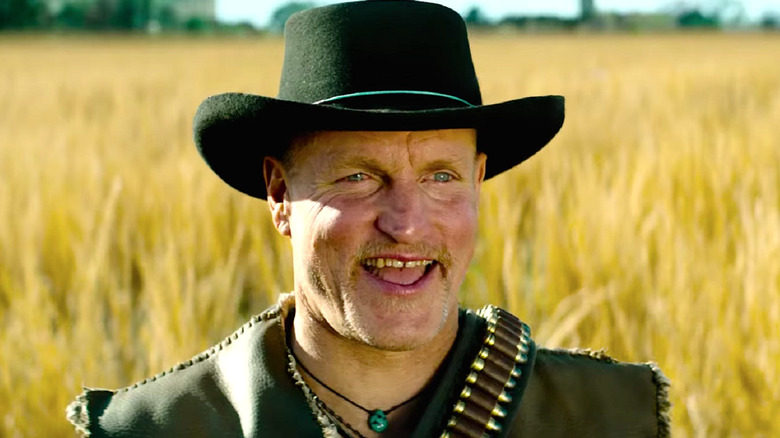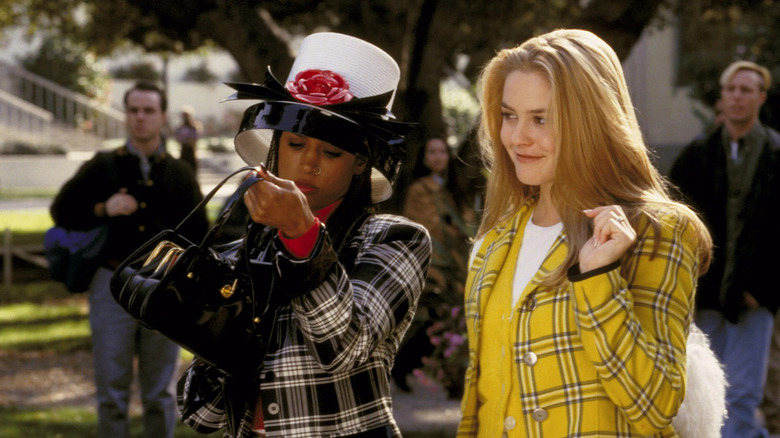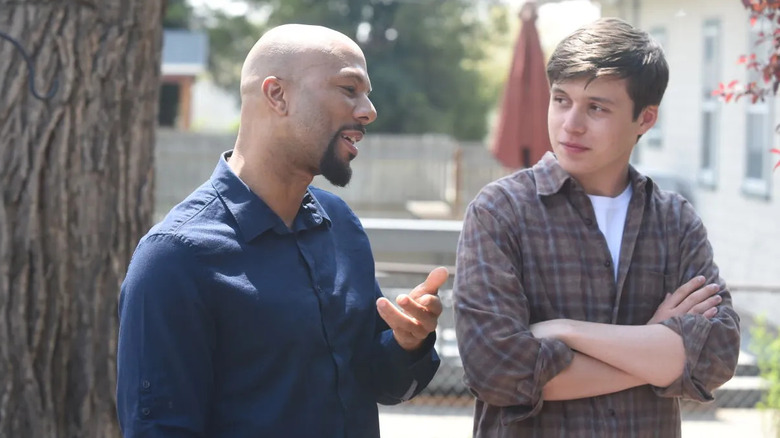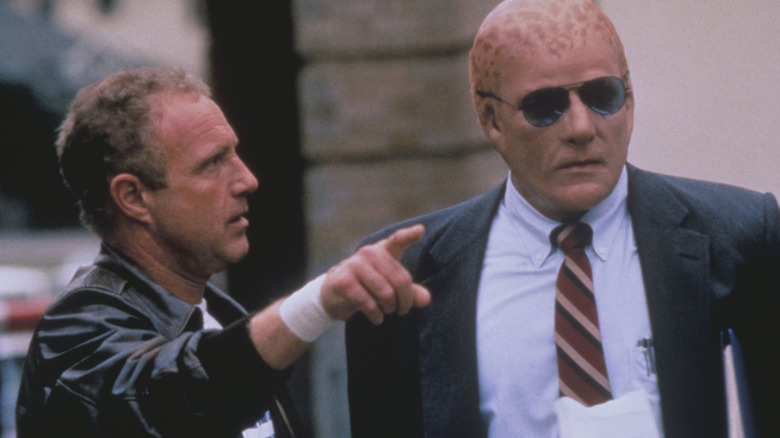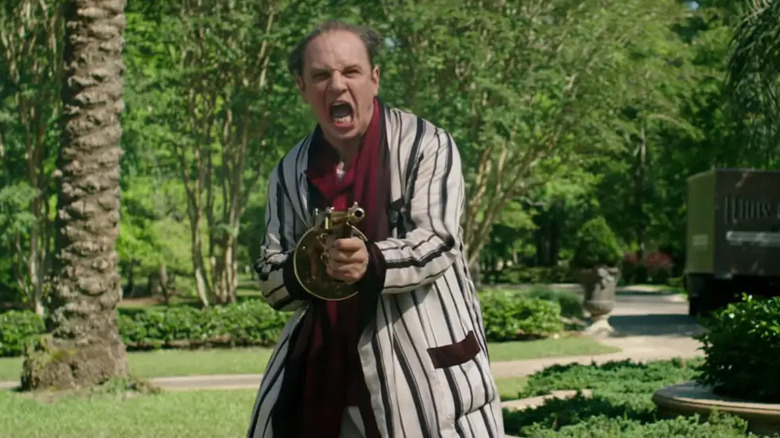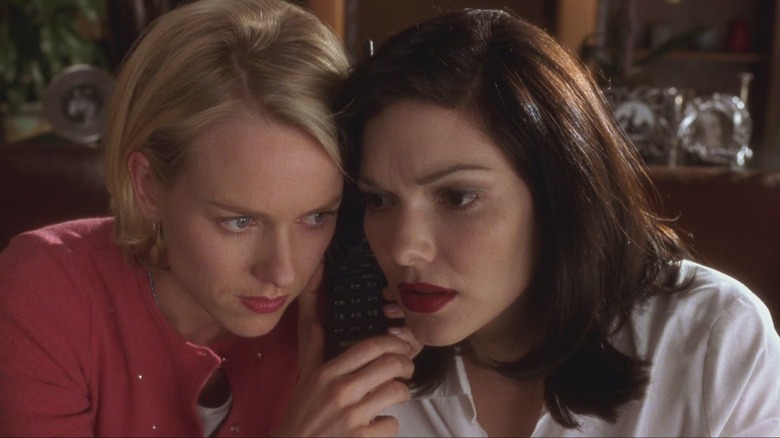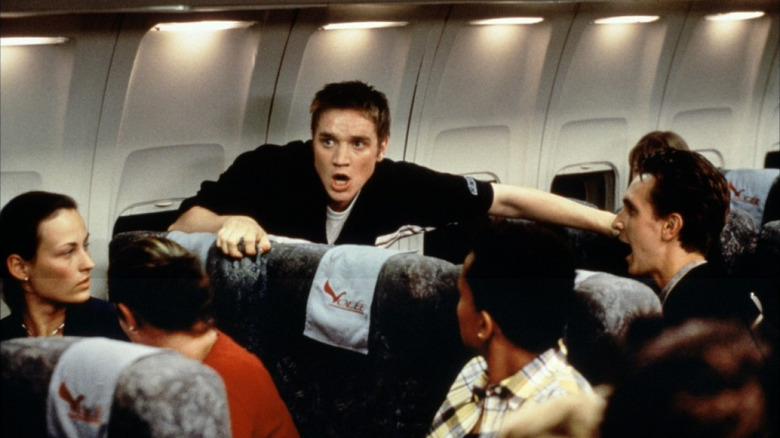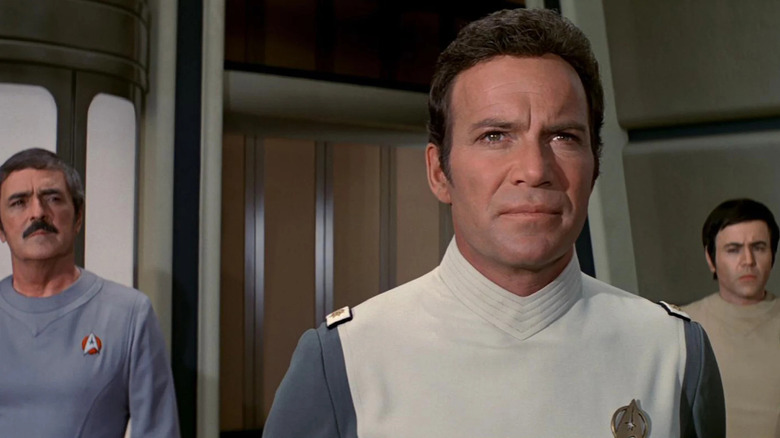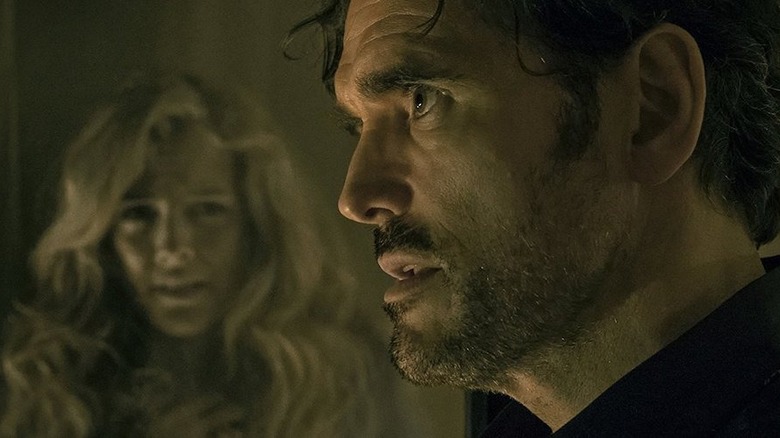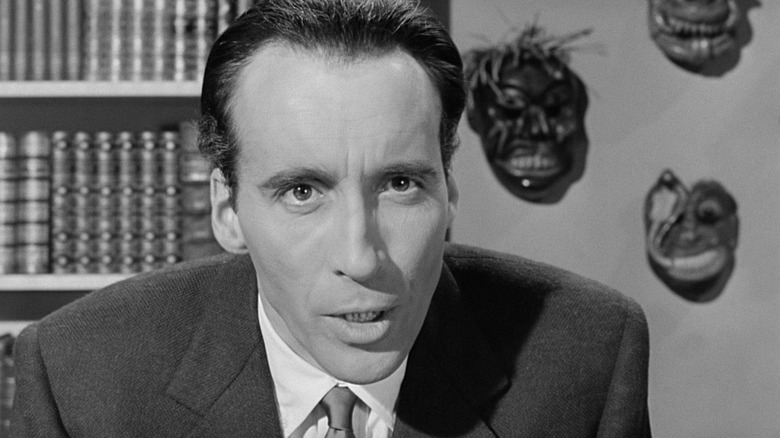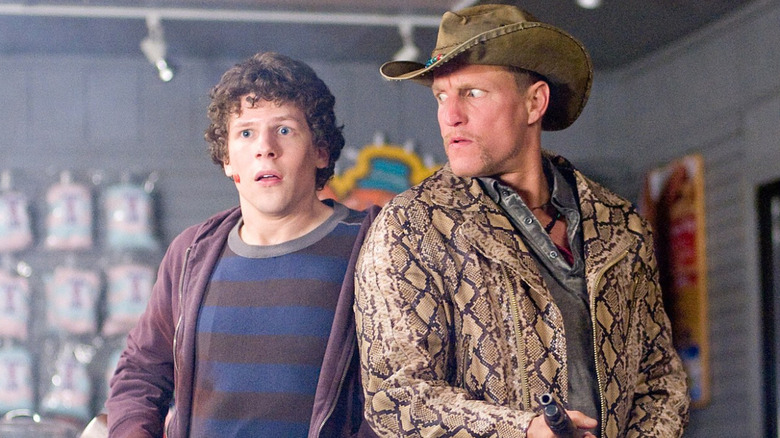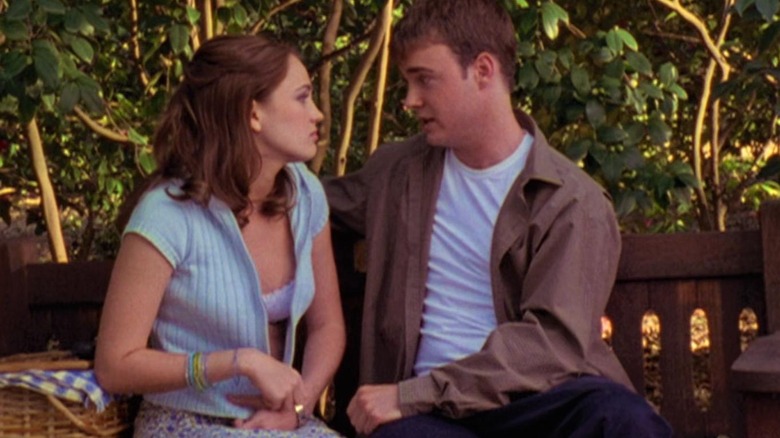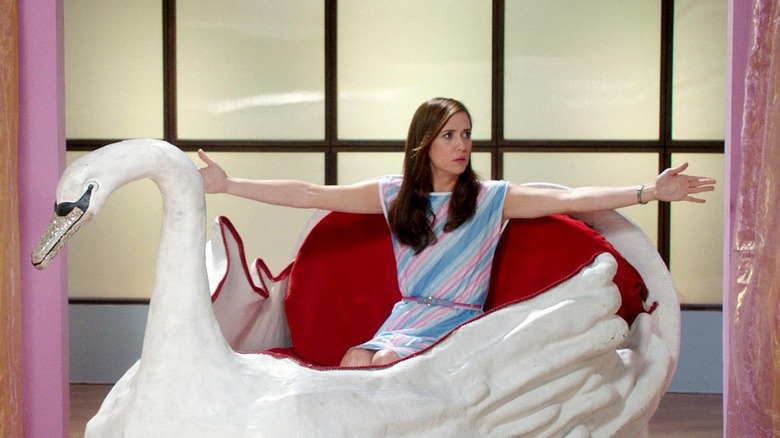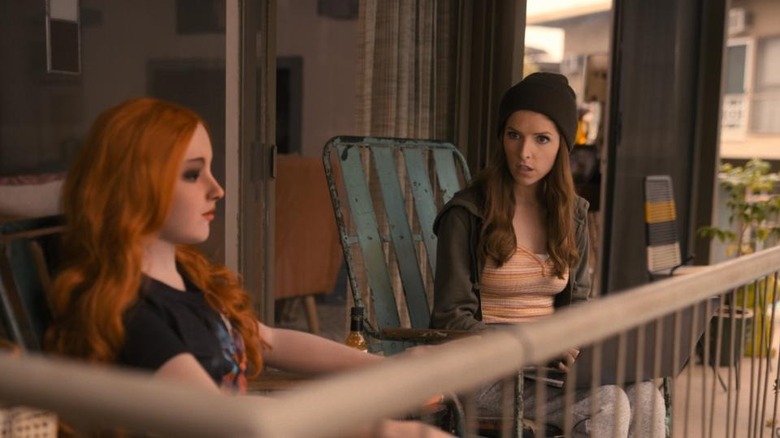Movies That Were Originally Planned As A TV Show
Hollywood can be a tough industry as any filmmaker can tell you. There are countless hurdles to overcome to make a movie happen, even for the most seasoned and powerful directors, and projects can be delayed or scrapped for the most curious of reasons. Some projects can take years to come together, others get stuck in development limbo, never to see the light of day. In other instances, big plans for a major movie can suddenly shift, as studios reassess their slates and re-evaluate projects in the pipeline.
In some cases, this means a project intended for the big screen moves to television and becomes a hit series, as was the case with "Game of Thrones" and "Obi-Wan Kenobi." But sometimes, it goes the other way around: a project developed with the intention of becoming an ongoing television series gets re-shuffled and turned into a major motion picture. It's not often, but when it does happen it's noteworthy. Looking through the annals of television history, you might even be surprised to learn that some of your favorite films were never intended for the big screen. Wondering which ones? Read on.
Clueless
In 1995, actress Alicia Silverstone starred as cheery, upbeat fashionista Cher Horowitz in "Clueless," a razor-sharp satire of life at a Southern California high school. Surrounded by a cast of oddballs played by Donald Faison, Brittany Murphy, Stacey Dash, and Paul Rudd, it became a pop culture phenomenon and catapulted just about every member of its cast to stardom.
But "Clueless" wasn't always ticketed for big-screen success, and was originally slated for TV. "Originally, it wasn't called 'Clueless'," said the film's writer/director Amy Heckerling in a joint interview with producer Twink Caplan in 1995 with Entertainment Weekly. "When I first pitched it as a TV show, it was called 'No Worries.' 20th Century Fox said they wanted a show about teenagers — but not the nerds. They wanted it to be about the cool kids." According to Caplan though, Fox wasn't sold on their pitch, telling EW, "When we showed 'No Worries' to Fox, it was obvious they didn't get it. They thought the script needed more boys in it."
According to the duo, nobody quite understood the premise of a positive, sunny teenager in the cynical, grunge-obsessed early '90s. Eventually, however, Heckerling's concept landed in the hands of a producer who loved it and just so happened to have a movie deal with Paramount, and the rest is history. Heckerling would eventually get her TV series too, with Faison and Dash reprising their roles in a TV sitcom spin-off that ran for three seasons.
Being Charlie
Director Rob Reiner is a member of one of Hollywood's great filmmaking families as the son of comic legend Carl Reiner. In addition to directing classics like "The Princess Bride" and "Stand by Me," he also acted, with memorable roles in everything from "All in the Family" to "New Girl." But his most personal project might be the 2015 film "Being Charlie," not just because he directed it, but because it was the first film written by a new addition to the family legacy: his son Nick Reiner.
A semi-autobiographical story of a young man who lives in the shadow of a famous father — this case a political figure — it centers on Charlie, a troubled teen whose struggles land him in rehab. According to son Nick, however, it wasn't always destined to be a movie, originally beginning life as a pilot script for a half-hour comedy series. He developed the concept while he sat in a rehabilitation clinic, and it eventually morphed into a script for a movie, with the help of his father. But the best trivia about "Being Charlie" isn't that it was originally planned as a TV show, but that its creation helped heal a rift between real-life father and son.
"Over the course of making the film, our relationship definitely changed," the elder Reiner told ABC News in 2015. "It wasn't terrible or anything, but it got better because I then understood a lot more of what he had gone through and he understood a bit more of what I had gone through."
If you or anyone you know needs help with addiction issues, help is available. Visit the Substance Abuse and Mental Health Services Administration website or contact SAMHSA's National Helpline at 1-800-662-HELP (4357).
Alien Nation
In the 1980s, science fiction saw a surge in popularity, and several classics about monsters from outer space. At the same time, dystopian sci-fi stories about futuristic lawmen like "Blade Runner" and "RoboCop" were in vogue, too. So in 1988, the gritty sci-fi crime drama "Alien Nation" had the idea to marry those two concepts, putting an alien in the role of a cop on the hunt for a killer.
The film starred James Caan as Matthew Sykes, an LAPD detective who's reluctantly partnered with alien officer Sam Francisco (Mandy Patinkin). But even as a well-received film, it was a TV series that the creator always had in mind. According to an article in SFX magazine in 2020 that interviewed writer Rockne S. O'Bannon, the film had started as a concept for a TV show pilot along the same lines.
After failing to get a development deal at a major studio, the project landed in the lap of James Cameron and partner Gale Anne Hurd, who hot off of their success on "Aliens" loved the concept. With a duo of Hollywood producing stars behind it, Bannon was more than happy to reshape his TV series into a feature film. A year after the film was released, of course, Bannon would get his wish when "Alien Nation" received a television spin-off.
Capone
Some television-to-movie evolutions come about when a producer feels an idea is too good to be limited to the small screen. Others move their show to a feature film when an interested producer has connections with a major movie studio. But the 2020 gangster biopic "Capone" took a different and more complicated path, with more than thirty years between two entirely different projects, connected by a lone Hollywood star: Tom Hardy.
Starting out in the 1970s as a TV pilot for a series titled "Cicero," the proposed series was created by "The Wild Bunch" scribe Walon Green. After decades in limbo, it was finally picked up by Warner Bros. in 2010 by which time it was now a screenplay for a big budget motion picture, per an announcement in Variety at the time. A year later, as reported by the Guardian, star Tom Hardy signed on to the project, with "Harry Potter" helmer David Yates slated to direct. Things never fell into place though, and the project was ultimately scrapped.
But Hardy had so fallen in love with the idea of playing Capone that he revived the concept a few years later with the help of beleaguered director Josh Trank (via Entertainment Weekly), who himself was looking for a comeback after years of controversy. Initially titled "Fonzo," the final result with the streaming original "Capone," starring Hardy, Linda Cardellini, Kyle MacLachlan, and Matt Dillon.
Mulholland Drive
Director David Lynch's most defining film, "Mulholland Drive" is a dark drama about an aspiring actress (Naomi Watts) who befriends a young woman suffering amnesia after a car crash. A masterpiece of modern cinema, its mix of mystery, crime noir, abstract dreamscape, and genuine horror made it not just Lynch's best, but a film often considered flawless. But a movie it almost wasn't, as it was originally dreamed up as a TV spin-off, of all things.
Following the smash success of his prime time ABC thriller "Twin Peaks," Lynch and co-creator Mark Frost were preparing a second series centered on the "Peaks" character of Audrey Horne (Sherilyn Fenn), and to be named after a famous street in Los Angeles where Frost lived. In his book "Conversations with Mark Frost," the series' co-creator talked about the evolution of the movie, from a TV pilot script to becoming a big screen success (via IndieWire). "We had considered spinning off the Audrey character and setting her loose in Hollywood, in a modern noir. We had very preliminary talks; it drifted away, and then six years later, I hear it's going be a pilot at ABC."
But when ABC passed on the project, Lynch reworked it into a single feature film with an entirely new cast of characters unrelated to "Twin Peaks," though Frost could only speculate as to why. "Maybe because 'Twin Peaks' had crashed and burned [after its first season], there wasn't much appetite for spinning off a series from it."
Final Destination
The late 1990s and early 2000s were awash in teen horror films, sparked by 1996's "Scream," and featuring memorable movies like "I Know What You Did Last Summer" and "Disturbing Behavior." The 2000 film "Final Destination" continued the trend into the new millennium, starting its own franchise that saw a slew of sequels over the next 11 years. The first told the story of an ill-fated airline flight whose would-be passengers had been destined to die, but it was almost something else entirely.
Believe it or not, the premise of "Final Destination" was originally developed as a script for the sci-fi TV series "The X-Files." The proposed episode, titled "Flight 180," was fairly similar to what ended up on the big screen, with a handful of passengers exiting a doomed flight before take-off after one of them has a fateful premonition, only for them to die one by one in other gruesome ways. But in this earlier version, the passenger who had the premonition of the plane's ultimate destruction was Scully's brother, lending a sense of serious suspense as the two paranormal investigators raced against time to save him.
According to legend, however, writer Jeffrey Reddick never sent the network his script, thanks to advice from a friend at New Line Cinema who felt the idea was far too good to be confined to a single episode of an existing franchise. Eventually, he'd expand on the story, center it on a group of teenage friends, and a franchise of his own was born.
Star Trek: The Motion Picture
The landmark TV series "Star Trek" dazzled audiences for three seasons in the 1960s before low ratings forced its cancelation. But when it got hot in reruns in the '70s, talk of a revival surfaced, and so a feature film seemed like the next logical step. Except that it wasn't, because while audiences did get a big budget continuation in 1979, "Star Trek: The Motion Picture," the film started out as a potential television relaunch under the title of "Star Trek: Phase II."
Developed as what would have been the flagship series for the launch of their own television network, Paramount had "Trek" creator Gene Roddenberry onboard and assembling scripts, while the studio re-signed the cast to return. Famously, actor Leonard Nimoy declined, apparently due to tensions with the network over the sale of merchandise with his likeness. But with new actors hired, sets were constructed, test footage produced, and the new TV series was all set to go when a little film from George Lucas landed in theaters in 1977.
After the success of "Star Wars," Paramount pivoted to a film. They used much of the work done for "Phase II," even repurposing its pilot script, "In Thy Image," while also settling their conflict with Nimoy, who would return as Mr. Spock. Remarkably, many of the original sets for "Phase II" continued to be used on spin-off shows through the 1990s before being torn down after the conclusion of "Star Trek: Voyager," the series that ultimately launched Paramount's TV network in 1995.
The House That Jack Built
Filmmaker Lars Von Trier, who is known for his controversial arthouse films like "Nymphomaniac," and "Anti-Christ" had a long career before he was a famed Hollywood director, starting out making shorts in the late 1960s. But his career hit its stride in the 1990s when he worked on several well-received television series in his native Denmark, most notably the 1994 miniseries "The Kingdom." But by 2018, Von Trier had a number of big Hollywood hits and was an acclaimed movie director when "The House That Jack Built," starring Matt Dillon, Bruno Ganz, and Uma Thurman, was released.
But the film, a decade-spanning story of a vicious serial killer, was previously set to be the director's triumphant return to television. In 2014, it was announced by Variety to be what producer Peter Aalbæk Jensen called "a TV series without precedent." Said to be an English language production filmed in Denmark, it would have been an 8-part series, as reported by Playlist. But the project hit the skids in 2016, making a sharp U-turn to the big screen.
What caused the abrupt about-face? It's not quite clear, but personal problems faced by Von Trier may have played a part in the decision, as the director mentioned his struggles with mental health that were ongoing.
City of the Dead
The notion of turning an intriguing television series concept into a major motion picture is certainly nothing new. In the late 1950s, one series that almost was wound up getting the big screen treatment, going on to become the 1960 horror movie "City of the Dead." Though not a zombie movie like you might expect from the title, the film told the story of a mysterious town inn that turned out to be controlled by a coven of sinister witches.
Initially developed by screenwriter George Baxt as a television pilot, it was intended as a starring vehicle for horror icon Boris Karloff. But not finding any takers from the networks at the time, producer Milton Subotsky took it upon himself to fill out the story with some new characters, and "City of the Dead" was born, though Karloff didn't star in the final version.
Stateside, the film was retitled "Horror Hotel," and was once lampooned by Riff Trax, but remains a cult favorite of horror aficionados who consider it a classic in the genre. Don't feel too bad that they didn't get the legendary Karloff though, as the film wound up starring none other than Christopher Lee, which is one reason why it remains so noteworthy.
Zombieland
With its tongue firmly planted in its rotting cheek, "Zombieland" was a wild satire of the horror genre, with Woody Harrelson, Jesse Eisenberg, Emma Stone, and Abigail Breslin as survivors of a zombie apocalypse who fight their way across the country. With a big name cast that included a memorable cameo from Bill Murray playing himself, it became a big box office hit and for a time was the highest-grossing zombie movie ever made.
Before it landed in theaters though, "Zombieland" was the brain spawn of writers Rhett Reese and Paul Wernick ("Deadpool"), who were hoping to turn their idea of a humorous zombie apocalypse into a TV series. "We wrote it as a TV pilot and sold it to CBS," Reese told Gizmodo in 2009. "They had a lot of notes, which we addressed. And then when they decided to not make the pilot we unaddressed a lot of them. We went back to what we had." Somewhere during the re-writing process after being rejected by the network, Reese and Wernick decided to turn their pilot script into a movie screenplay instead.
Years later, after a sequel, "Zombieland: Doubletap," the duo got another shot at television, with the filming of a pilot for a spin-off as part of Amazon's pilot program in 2014. While reviewers had kind words, the streaming service passed on turning it into a full series (via Hollywood Reporter).
Cruel Intentions 2
A teen thriller film from the mid-1990s, "Cruel Intentions" was a dark drama about a pair of friends who play a twisted game with a school friend who had vowed to stay celibate. Starring a trio of rising stars, Reese Witherspoon, Ryan Phillipe, and Sarah Michelle Gellar, it was a modest hit that grew a fervent fan following, so it made perfect sense for a follow-up. The result was "Cruel Intentions 2," a prequel set a few years earlier at a prestigious boarding school. It followed the exploits of a twisted teen who moves to a new town and gets involved in some serious drama of his own at his new school.
But this one skipped theaters, released direct-to-video in 2000, and it had a noticeably cheaper look and feel, with a new cast of mostly unknowns. Curious viewers of the first film who saw it may have suspected what we all know now: The sequel was originally filmed as a TV pilot. As it turns out, following the success of the first movie, a spin-off prequel titled "Manchester Prep" was developed, and at least two episodes were filmed. But unimpressed with the results, and concerned its envelope-pushing story might not play on network TV, the studio scuttled the project (per Variety). In an attempt to recoup their investment, they chopped up the episodes and repackaged them as a direct-to-video feature.
Welcome to Me
The debut directorial effort of Shira Piven, the 2014 comedy-drama "Welcome to Me" starred SNL alum Kristen Wiig as a troubled woman who wins the lottery and starts her own talk show to deal with her problems. A treatise on mental health, it was a poignant story of one woman's journey to understanding herself. Praised for its offbeat comedy, it was Wiig who drew the lion's share of accolades from reviewers, with a powerful and moving big-screen performance. But if the movie's writer had done it the way he had originally envisioned it, Wiig may have found herself back on television, because it was initially written as a TV pilot.
Speaking to Under the Radar about how the film came to be, director Shira Piven recalled the original pilot script by writer Eliot Laurence. "I think he wanted it to be the kind of pilot for a show that would be on HBO or Showtime; kind of a more interesting cable show." Interested in directing his story, Piven asked him to rewrite it as a screenplay, and he happily did just that. "At the time I didn't even know if I was advising him to do the right thing. I just really felt like it was a movie, and I wanted to work with him. And it was not that big of a leap from that original pilot to this screenplay."
Dummy
2020 was an anomalous year for a variety of reasons, but it also saw the life and death of a short-form streaming service called Quibi. Landing with great fanfare, it featured plenty of big names, including Liam Hemsworth, Sophie Turner, and Laurence Fishburne, with filmmakers Steven Soderbergh, Sam Raimi, and Antoine Fuqua involved in various capacities. Not quite films, but not quite TV shows, their programming consisted of "seasons" of seven- to 10-minute "episodes." One such series was "Dummy" starring Anna Kendrick as Cody, a writer who learns that her boyfriend (Donal Logue) owns a sex doll.
Based on the real-life experiences of creator Cody Heller and her partner Dan Harmon (creator of "Rick and Morty"), it was one of the most unusual films... or shows... of the year. But when it was initially written, it was intended to be a full-fledged television series of full-length episodes. Originally drafted as a TV pilot, as revealed in a report published in Deadline, the script slowly evolved into a feature film.
But Heller would get her series in a way because once it was acquired by the doomed streaming platform, the film was chopped up it into 10 nine-minute episodes. So though it was filmed as a movie, it also became a TV series... or did it? To this day, no one seems to know quite how to label Quibi movies... er... shows. Oh, forget it.
